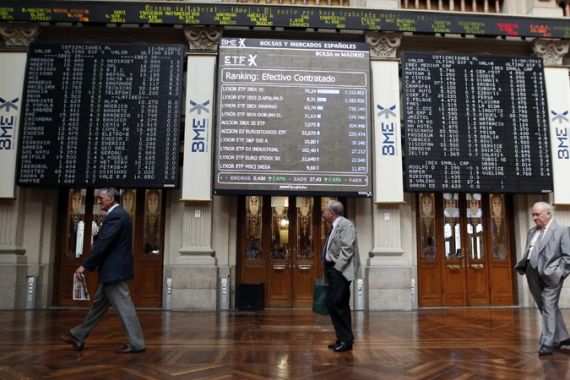Spanish borrowing costs rise on debt fears
Bond yields in Madrid reach euro-era highs, as Spanish banks suffer further downgrades, amid scepticism over bailout.

Spain’s bond yields have hit euro-era highs and many of its banks suffered a further credit downgrade as rising scepticism over a $125-billion bailout for the country’s financial sector drove investors away from Spanish debt.
After the Fitch credit ratings agency downgraded 18 domestic banks, Spain’s 10-year bond yield traded at 6.78 per cent on Tuesday, according to data provider FactSet.
Keep reading
list of 4 itemsCalifornia farmworkers cheer new housing in town scarred by mass shooting
Russia’s Putin eyes greater support from China for Ukraine war effort
India-Iran port deal: A gateway to Central Asia or a geostrategic headache?
That put government bond yields at their highest since the euro was launched in 1999, driven higher by concerns that Madrid may find it increasingly difficult to access debt markets in the longer term and fears among current holders of debt about falling to the back of the queue for repayment.
Italian yields also rose as attention turned to the state of Rome’s finances, with Maria Fekter, Austria’s finance minister, saying the country could need a financial rescue because of its high borrowing costs.
The statement drew a furious rebuke from Mario Monti, the Italian prime minister.
“It is totally inappropriate for ministers to comment on issues referred to other EU member countries, and as such I won’t comment on her comments,” Monti said at a press conference in Rome.
Greece’s looming elections on June 17, which could bring to power parties opposed to the country’s current bailout plan and push Athens closer to a disorderly exit from the eurozone, also seemed to be fuelling investor caution.
“There’s no clear driver for markets until we get some clarity on Greece and the deal in Spain,” said David Carter, chief investment officer at Lenox Wealth Advisors in New York. “We’ll just drift higher and lower with no real conviction.”
The euro was trading near break-even for the day versus the dollar at about $1.246.
“Investors will likely continue to sell the euro into strength, especially with Greek elections on Sunday and a European Union summit next week, which should be heavy in headlines,” said Camilla Sutton, chief currency strategist at Scotia Capital in Toronto. “Any euro rally should prove short-lived.”
Credit downgrade
Ratings agency Fitch said on Tuesday that it downgraded 18 more Spanish banks just a day after cutting its ratings on the two biggest banks, Santander and BBVA, despite a massive sector bailout.
Fitch, which cut Spain’s sovereign debt rating by three notches last week to “BBB”, said on Tuesday that its latest downgrade of Spanish banks was the result of “the potential for the loan portfolios of certain banks to deteriorate further”.
The agency said this applied specifically to “those banks whose loan books are heavily exposed to the construction and real estate sectors, and those with low equity bases”.
Among the 18 banks was CaixaBank, the third biggest Spanish bank in terms of market capitalisation, which was downgraded two notches to “BBB”.
Bankia, which is to receive 23.5 billion euros ($29.4bn) in public aid, was cut one notch and is now also at “BBB”.
On Monday, Fitch said it had downgraded Santander and BBVA to “BBB+” from “A”, placing them just three levels above junk territory but one notch above Spain itself.